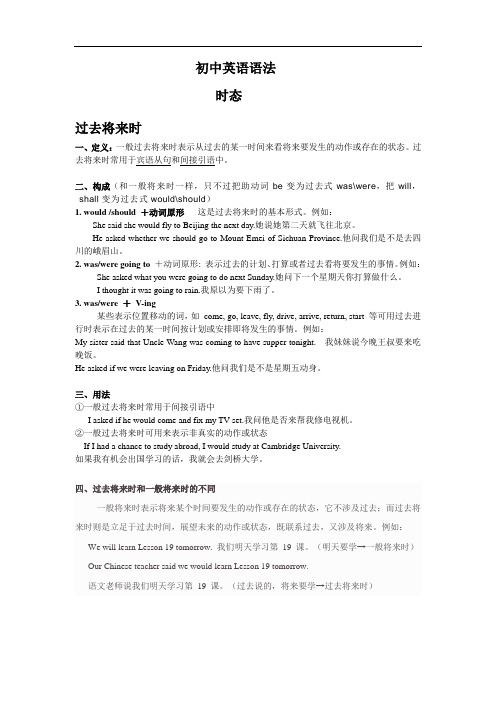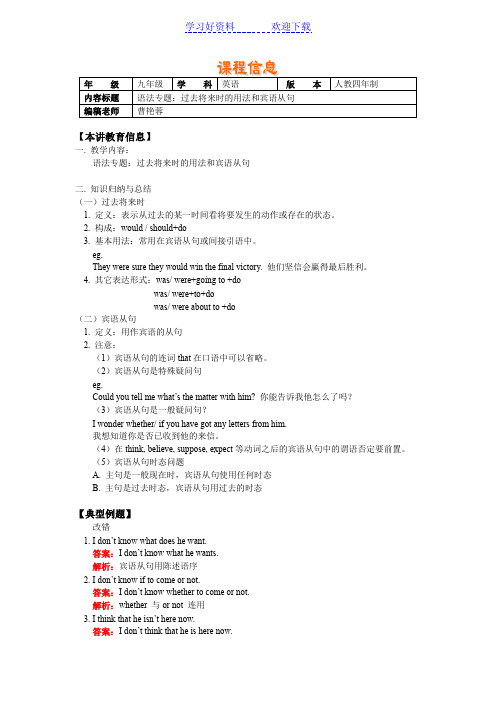宾语从句.过去将来时
宾语从句时态三大原则

宾语从句时态三大原则宾语从句时态三大原则是指:主句时态、主谓一致、语气一致。
1、主句时态原则:主句是一般现在时,宾语从句也一般用一般现在时;主句是一般过去时,宾语从句也一般用一般过去时;主句是将来时,宾语从句也一般用将来时。
比如:He told me he would come tomorrow. 他告诉我他将来明天来。
2、主谓一致原则:宾语从句的谓语动词与主句的主语保持一致,即如果主句的主语是单数,宾语从句的谓语动词也要用单数;如果主句的主语是复数,宾语从句的谓语动词也要用复数。
比如:She said she likes reading books. 她说她喜欢读书。
3、语气一致原则:宾语从句的语气要与主句保持一致,即宾语从句的语气必须和主句的语气保持一致。
如果主句是陈述句,宾语从句也应该是陈述句;如果主句是祈使句,宾语从句也应该是祈使句。
比如:He said to me: "Please come here." 他对我说:“请你到这里来。
”4、主句是一般现在时,宾语从句可以用一般将来时表示将来,表示推测、猜测或假设,即主将从现。
比如:I think he will come tomorrow. 我认为他将来明天会来。
5、主句是一般将来时,宾语从句可以用一般现在时表示将来,表示推测、猜测或假设,即主将从现。
比如:He will come tomorrow, I think. 我认为他明天会来。
6、主句是一般过去时,宾语从句可以用过去将来时,表示主句过去时发生时,宾语从句本来应该发生的事情,即主过从将。
比如:He said he would come tomorrow. 他说他将来明天会来。
7、主句是一般现在时,宾语从句可以用过去完成时,表示宾语从句发生在主句发生之前,即主现从过。
比如:She said she had seen him before. 她说她以前见过他。
8、主句是一般过去时,宾语从句可以用一般过去时或过去完成时,表示宾语从句发生在主句发生之前,即主过从过。
英 语语法 过去将来时及初中时态归纳

初中英语语法时态过去将来时一、定义:一般过去将来时表示从过去的某一时间来看将来要发生的动作或存在的状态。
过去将来时常用于宾语从句和间接引语中。
二、构成(和一般将来时一样,只不过把助动词be变为过去式was\were,把will,shall变为过去式would\should)1. would /should +动词原形这是过去将来时的基本形式。
例如:She said she would fly to Beijing the next day.她说她第二天就飞往北京。
He asked whether we should go to Mount Emei of Sichuan Province.他问我们是不是去四川的峨眉山。
2. was/were going to+动词原形: 表示过去的计划、打算或者过去看将要发生的事情。
例如:She asked what you were going to do next Sunday.她问下一个星期天你打算做什么。
I thought it was going to rain.我原以为要下雨了。
3. was/were +V-ing某些表示位置移动的词,如come, go, leave, fly, drive, arrive, return, start 等可用过去进行时表示在过去的某一时间按计划或安排即将发生的事情。
例如:My sister said that Uncle Wang was coming to have supper tonight. 我妹妹说今晚王叔要来吃晚饭。
He asked if we were leaving on Friday.他问我们是不是星期五动身。
三、用法①一般过去将来时常用于间接引语中I asked if he would come and fix my TV set.我问他是否来帮我修电视机。
②一般过去将来时可用来表示非真实的动作或状态If I had a chance to study abroad, I would study at Cambridge University.如果我有机会出国学习的话,我就会去剑桥大学。
宾语从句五大考点透视

3.“Did you sleep well last night?” David asked her. (改为复合句,句意不变)
David asked her ___ ___ ___ well last night.
4.I am not sure _____ he will come back home tomorrow or not.
12. -Where does he come from? –Pardon? –I asked where _____.
A. did he come from B. he came from C. he comes from D. does he come from
13.“When do you have your art lessons?” Mum asked me.
1.Can you see _____?
A. what he’s reading B.what is he reading C.what does he read D.he reads what
2.Is it really true _____ Mr. Black will go back to England soon for a holiday?
8.Could you tell me _____? I’m his old friend.
A. where does Jim live B.when will Jim come back
C.where Jim has gone D.how is Jim
9.You can’t imagine _____ when they received these nice Christmas presents.
宾语从句用法小结

宾语从句用法小结宾语从句是初中英语中最重要的语法之一。
中考经常会出现相关的题目。
掌握宾语从句应注意 三方面要素。
下面的表格可以帮助大家理解这一部分内容宾语从句的时态问题所谓过去的某个时态指的是如下的变化接下来我们一起来具体了解宾语从句的用法以及应注意点(你认为重要的或者容易出错的地方最好用红笔划出来)一、 宾语从句的引导词1. 当由 来充当宾语从句时,用 引导,that 无词义常省略。
eg. I think (that) he is right.I know (that) she is a Canadian athlete. I’m sure (that) he will get the job.I’m glad (that) you are trying to help others. He tells me (that) he will work hard this term. 2. 当由 做宾语从句时,引导词由原来的 来充当。
有意义不能省略。
从句的语序 要用 。
句末的标点符号由主句决定。
常出现 的特殊疑问词:when, why, how, where, who 、whom 、 whose 、which, what 等。
eg. 1) He asks. How can they get to school? He asks how they can get to school.2) Do you know? When did he buy this pen? Do you know when he bought this pen? 3) Can you tell me ? What is your name ? Can you tell me what your name is ?3. 当由充当宾语从句时,用或引导,意为“是否”“是不是”“能否”等。
eg. 1) He asks me if/ whether he can come.2) I’m not sure if/ whether she will help me.3) Do you know if/ whether the train will arrive on time?特别注意:1)直接与or not连用时,往往用whether 不用ifeg. Let me know whether or not he will come让我知道他是否能来。
语法专题过去将来时的用法和宾语从句

【本讲教育信息】一. 教学内容:语法专题:过去将来时的用法和宾语从句二. 知识归纳与总结(一)过去将来时1. 定义:表示从过去的某一时间看将要发生的动作或存在的状态。
2. 构成:would / should+do3. 基本用法:常用在宾语从句或间接引语中。
eg.They were sure they would win the final victory. 他们坚信会赢得最后胜利。
4. 其它表达形式:was/ were+going to +dowas/ were+to+dowas/ were about to +do(二)宾语从句1. 定义:用作宾语的从句2. 注意:(1)宾语从句的连词that在口语中可以省略。
(2)宾语从句是特殊疑问句eg.Could you tell me what’s the matter with him? 你能告诉我他怎么了吗?(3)宾语从句是一般疑问句?I wonder whether/ if you have got any letters from him.我想知道你是否已收到他的来信。
(4)在think, believe, suppose, expect等动词之后的宾语从句中的谓语否定要前置。
(5)宾语从句时态问题A. 主句是一般现在时,宾语从句使用任何时态B. 主句是过去时态,宾语从句用过去的时态【典型例题】改错1. I don’t know what does he want.答案:I don’t know what he wants.解析:宾语从句用陈述语序2. I don’t know if to come or not.答案:I don’t know whether to come or not.解析:whether 与or not 连用3. I think that he isn’t here now.答案:I don’t think that he is here now.解析:think后面的宾语从句的否定前置4. I don’t know that how he did it.答案:I don’t know how he did it.解析:how 就是连接词,故that删去。
初中英语《宾主从句的时态变化》知识点

初中英语《宾主从句的时态变化》知识点初中英语《宾主从句的时态变化》知识点宾语从句的时态(1) 若主句是一般现在时、一般将来时或祈使句时,宾语从句根据句子的意义使用需要的时态。
如:We don’t know who has broken the window. But we will find out who has done that.Please tell me where we will go.(2) 若主句是一般过去时,宾语从句要用相应的某种过去时态,如一般过去时、过去进行时、过去将来时或过去完成时。
如:He said: I’m a student. ----- He said that he was a student.The teacher asked: What is Mike doing? ----- The teacher asked what Mike was doing.(3) 若宾语从句叙述的是客观真理或永恒不变的规律,则应采用一般现在时,不受主句时态的限制。
如:Our teacher said that the earth moves round the sun.返回:初中英语知识点详解——宾语从句篇初中英语语法知识点总结:接动名词作宾语的动词接动名词作宾语的动词【速记口诀】Mrs.P Black missed a beef bag.【妙语诠释】该句话中每个字母代表了一个动词或短语,这些动词要求后面跟动名词作宾语。
这些动词分别是:M=mind,r=risk,s=succeedin,P=practice,B=bebusy,l=lookforwardto,a=admit,c=can’thelp,k=keepon,m=miss,i=insiston,s=suggest,s=stop,e=enjoy,d=delay,a=avoid,b=beworth,a=advise,g=giveup。
英语时态:过去将来时
英语时态:过去将来时过去将来时(The Past Future Tense)通常来说指的是一般过去将来时(The Simple Past Future Tense),表示从过去的某一时间来看将来要发生的动作或呈现的状态,基本出发点是过去,过去某一时刻以后要发生的事情;过去将来时常用于宾语从句中。
Ⅰ. 句法结构:1.陈述句:A. 肯定形式:主语+be going to /would/should +动词原形+其他B. 否定形式:主语+be not going to或would/should not+动原+其他注:a. 否定形式直接在助动词后加not。
b. be going to结构中的be动词指was和were。
c. would/should+动原结构在谓语两态变化中无人称和数的变化。
2.疑问句:A. 一般疑问句:助动词提前即可①Was/Were+主语+ going to +动词原形+其他②Would/Should+主语+动词原形+其他B.特殊疑问句:特殊疑问词+一般疑问句(同上)3.被动语态:主语+ 助动词(结构) + be +动词过去分词【被动结构be done,时体现在助动词】➢两态变化例句参考下表:注意:一般情况下,一般将来过去时都在宾语从句中出现,所以在变成一般疑问句和特殊疑问句时,将主句变成疑问句语序即可,宾语从句仍保持陈述句结构。
eg. Did you know that he would make cakes? (变一般疑问句)Did you know when he would make cakes? (变特殊疑问句)Ⅰ. 主要用法:1.“would+动词原形”常表示主观意愿的将来。
He said he would come to see me.He told me he would go to Beijing.2.“was/were going to+动词原形”常表示按计划或安排即将发生的事。
宾语从句主句和从句的时态
宾语从句主句和从句的时态1、主句是一般现在时,从句根据实际情况使用任何时态。
例句:She says (that) she works from Monday to Friday.她说她从周一至周五上班。
(从句是一般现在时)She says (that) she will leave a message on his desk.她说她要在他桌子上留个便条。
(从句是一般将来时)2、主句是过去时态,从句须用过去时态的某种形式。
例句:He said there were no classes yesterday afternoon.他说昨天下午没有课。
(从句是一般过去时)He said (that) he was going to take care of the baby.他说他会去照看这个婴儿。
(从句是过去将来时)3、当宾语从句表示的是一个客观真理或者事实时,即使主句是过去时,从句也用一般现在时态。
例句:The teacher told us(that) nothing is difficult if we put our hea rts into it.老师告诉我们世上无难事,只怕有心人。
She said(that) her father is twenty-eight years older than her.她说她父亲比她大二十八岁。
He said that light travels much faster than sound.他说光比声音传播得快。
注意:当主句的谓语动词是think或believe,宾语从句要表达否定时,要把从句的否定转移到主句上。
I don't think he is going to help you with your English.我认为他不会帮你学英语的。
这句话不可以翻译成:I think he isn't going to help you with your English.如果宾语从句有它的补语时,宾语从句用it代替,从句后置。
宾语从句中的时态和语序问题
宾语从句中的时态和语序问题宾语从句是一个句子中作为宾语的从句,它常常由连接代词(如that、whether/if、who、whom、which、whose等)或连接副词(如when、where、why、how等)引导。
在宾语从句中,时态和语序是需要特别注意的问题。
本文将就这两个问题展开探讨。
一、时态问题1. 当主句的谓语动词是现在时(一般现在时、现在进行时、一般将来时)时,宾语从句通常保持不变,表示客观事实、普遍真理或者将来发生的事情。
例如:He said that he is a student.(他说他是一个学生。
)She wonders if they are coming to the party.(她想知道他们是否会来参加晚会。
)The teacher told us that the train will arrive at 8 a.m.(老师告诉我们火车会在上午八点到达。
)2. 当主句的谓语动词是过去时(一般过去时、过去进行时、过去将来时)时,宾语从句需根据具体情况改变时态。
若宾语从句中的动作或状态与主句谓语动词表示的时间关系相同,保持不变。
例如:She said that she was tired.(她说她很累。
)I asked him if he had finished his homework.(我问他是否完成了作业。
)若宾语从句中的动作或状态与主句谓语动词表示的时间关系不同,需进行相应的时态转换。
例如:He told me that he would come tomorrow.(他告诉我他明天会来。
)I wondered if he had received the email.(我想知道他是否收到了邮件。
)3. 当主句的谓语动词是过去完成时时,宾语从句中的谓语动词需使用过去完成时。
例如:She said that she had already eaten lunch.(她说她已经吃过午饭了。
语法进阶指南宾语从句中的时态转换
语法进阶指南宾语从句中的时态转换语法进阶指南:宾语从句中的时态转换宾语从句是复合句中常见的一种从句结构,用来充当主句中的宾语。
在宾语从句中,时态的转换尤为重要,因为它决定了句子的时态一致性和语义的准确性。
本文将探讨宾语从句中的时态转换规则及常见问题,并提供一些实用的技巧和例句供读者参考。
时态转换规则在宾语从句中,时态的转换原则如下:1. 一般现在时转为一般过去时:主句的动词时态为过去时,宾语从句的动词时态一般转为过去完成时。
例如:- 主句:He said that he had finished his homework.- 宾语从句:I finish my homework.2. 一般将来时转为过去将来时:主句的动词时态为过去时,宾语从句的动词时态一般转为过去将来时。
例如:- 主句:She wondered if he would come to the party.- 宾语从句:He will come to the party.3. 现在进行时转为过去进行时:主句的动词时态为过去时,宾语从句的动词时态一般转为过去进行时。
例如:- 主句:I asked her if she was studying at that time.- 宾语从句:She is studying at that time.4. 一般过去时转为过去完成时:主句的动词时态为过去时,宾语从句的动词时态一般转为过去完成时。
例如:- 主句:She told me that she had already finished her work.- 宾语从句:I finish my work.5. 情态动词应保持不变:无论主句的动词时态如何,宾语从句中的情态动词(can, could, may, might, will, would, shall, should, must等)一般不做时态的转换。
例如:- 主句:She asked if I could help her.- 宾语从句:I can help her.常见问题与技巧1. 直接引语和间接引语的时态转换:当使用直接引语将宾语从句表达出来时,时态转换按照上述规则进行。
- 1、下载文档前请自行甄别文档内容的完整性,平台不提供额外的编辑、内容补充、找答案等附加服务。
- 2、"仅部分预览"的文档,不可在线预览部分如存在完整性等问题,可反馈申请退款(可完整预览的文档不适用该条件!)。
- 3、如文档侵犯您的权益,请联系客服反馈,我们会尽快为您处理(人工客服工作时间:9:00-18:30)。
宾语从句(The Object Clause)学习宾语从句要抓住三要素:连接词、语序和时态。
一.宾语从句的定义宾语从句在复合句中起宾语的作用,可以作动词的宾语,也可以做介词的宾语作动词的宾语:I heard that he would come here later on.主语谓语动词一个句子作宾语作介词的宾语:He said nothing about who broke the window last night.主语谓语动词代词作动词的宾语介词一个句子作介词的宾语二.宾语从句中引导词(连接词)的用法在复合句中作主句的宾语,引导词有:连词:that (that 常可省略),whether, if代词:who, whose, what ,which副词:when ,where, how, why 等。
①连词:He told me (that he would) go to the college the next year 他告诉我他明年上大学.I don’t know if there will be a bus any more. 我不知道是否还会有公交车.Nobody knew whether he could pass the exam. 没有人知道他是否会通过考试.that引导的宾语从句(在非正式场合that可以省略)可跟that从句做宾语的动词有:say, think, insist, wish, hope, demand, imagine, wonder, know, suppose, see, believe, agree, admit, deny, expect, explain, order, command, feel, dream, suggest, hear, mean, notice, prefer, request, require, propose, declare, report等。
The boy believes that he will travel through space to other planets.Attention:宾语从句的否定转移当主句谓语动词是think, believe, suppose, expect 等词,而宾语从句的意思是否定时,常把否定转移至主句表示。
I don’t think it is right for him to treat you like that.主句的谓语动词是think,believe,imagine,suppose,consider,expect,fancy,guess等,并且主句的主语是第一人称而且为一般现在时,从句的否定词一般要转移到主句上来,其反义疑问句一般与宾语从句一致.I don’t believe that man is killed by Jim,is he?我认为那个人不是Jim所杀的,是不是?I expect our English teacher will be back this weekend, won't she/he?We suppose you have finished the project, haven't you?如果宾语从句中有某个含有否定意义的形容词或副词(不包含带有否定前缀的词,如:unhappy,unfair,dislike等),其反义疑问句要用肯定形式.We find that he never listens to the teacher carefully, does he?我们发现他从不仔细听老师讲课,是不是?当主句的主语是第二、三人称时,其反义疑问句一般与主句保持一致。
Your sister supposes she needs no help, doesn't she?You thought they could have completed the project, didn't you?They don't believe she's an engineer, do they?She doesn't expect that we are coming so soon, does she?在以下情况中that不能省略1、当句中的动词后接多于两个由that引导的宾语从句时,第一个that可省,但后面的that不可省。
I believe(that)you have done your best and that things will get better.2、当主句的谓语动词与that宾语从句之间有插入语时,that一般不可省。
Just then I noticed, for the first time, that our master was wearing his fine green coat and his black silk cap.3、当that从句是双宾语中的直接宾语时,that不可省。
I can’t tell him that his mother died.4、当it作形式宾语时例句:She made it clear that she had nothing to do with him.许多带复合宾语的句子,that引导的宾语从句经常移到句子后部,而用it作形式宾语。
5、当宾语从句前置时That our team will win,I believe.6、当that作learn,suggest,explain,agree,wonder,prove,mean,state,feel,hold等动词的宾语时;由whether,if 引导的宾语从句当由一般疑问句充当宾语从句时,用if或whether引导,意为“是否”。
如:I don't know if /whether he still lives here after so many years.我不知道这么多年后他是否还住在这儿。
但在下列情况下只能用whether,不能用if:①在具有选择意义,又有or或or not时,尤其是直接与or not连用时,往往用whether(if…or not也可以使用)。
如:Let me know whether /if he will come or not.(=Let me know whether or not he will come)让我知道他是否能来。
I don't know whether /if he does any washing or not.(=I don't know whether or not he does any washing.)我不知道他洗不洗衣服。
I wonder whether we stay or whether wego.我不知道我们是去还是留。
②在介词之后用whether。
如:I'm interested in whether he likes English.我关心的是他是否喜欢英语。
We're thinking about whether we can finish the work on time.我们正在考虑是否能按时完成这项工作。
③在不定式前用whether。
如:He hasn't decided whether to visit the old man.他尚未决定是否拜访那位老人。
He hasn't decided whether to go by bus or by train.他还未决定是乘公共汽车去还是坐火车去。
④whether置于句首时,不能换用if。
如:Whether this is true or not,I can't say.这是否真的我说不上来。
⑤引导主语从句和表语从句时宜用whether。
如:Whether she will come or not is still a question.她是否能来还是个问题。
⑥若用if会引起歧义时,则用whether。
如:Please let me know if you like the book.可理解为:b.If you like the book,please let me know.你如果喜欢这本书,请告诉我只能用if不能用whether引导的宾语从句1、if引导条件状语从句,意为“如果”The students will go on a picnic if it is sunny.2、if引导否定概念的宾语从句时He asked if I didn’t come to school yesterday.3、引导状语从句even if(即使)和as if(好象)时He talks as if he has known all about it.连接代词和连接副词引导的宾语从句这样的宾语从句实际上是由特殊疑问句变化而来的,宾语从句要用陈述句语序。
用于这种结构的动词常常是:see, say, tell, ask, answer, know, decide, show, find out, imagine, suggest, doubt, wonder, discover, understand, inform, advise等。
②连接代词:who,whom,whose,which,what,在句中担任主语、宾语、定语或者表语。
连接代词一般指疑问,但what, whatever除了指疑问外,也可以指陈述.Do you know who has won Red Alert game?你知道是谁赢得了红色警报的游戏么?The book will show you what the best CEOs should know.这本书会告诉你最好的执行总裁该了解什么.Have you determined whichever you should buy,a Motorola or Nokia cell phone?你决定好是买诺基亚还是摩托罗拉的电话了吗?③连接副词有:when,where,why,how,在句中担任状语的成分。
He didn’t tell me when we should meet again. 他没有告诉我什么时候我们能再见面.Could you please tell me how you use the new panel?你能告诉我怎么用这个新的操作盘吗?None of us knows where these new parts can be bought.没有人知道这些的新的零件能在哪里买到.三.宾语从句的语序宾语从句的语序是陈述句语序即:连接代词/副词+主语+谓语+其他成分。
